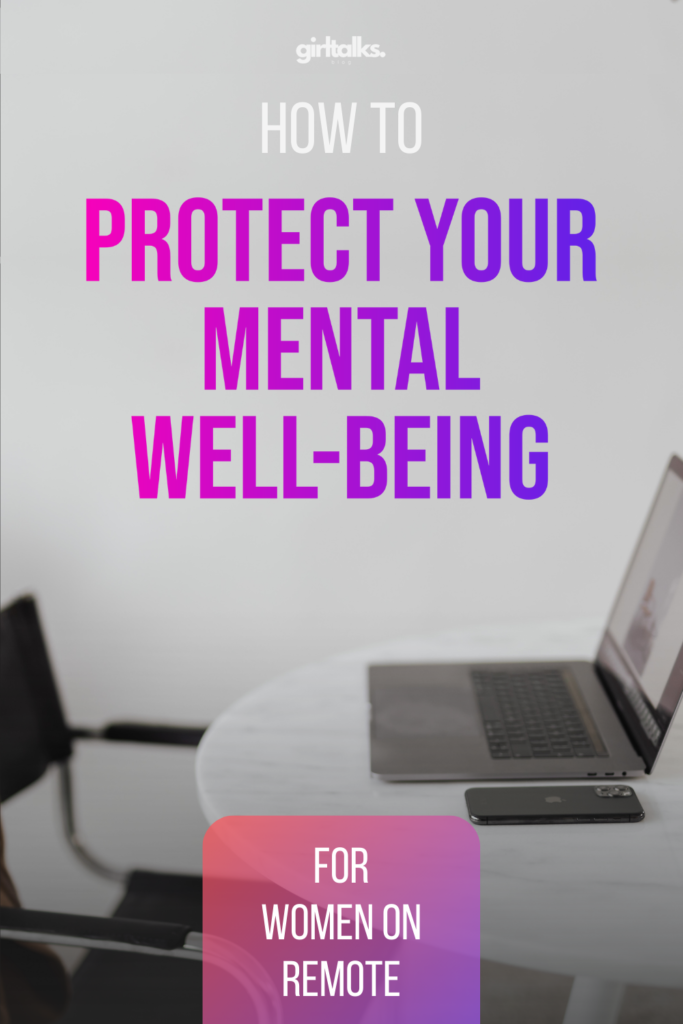Struggling to stay balanced while working from home? Discover how to protect your mental well-being and reclaim your peace, even on the busiest days. Remote work can feel like a dream – until it doesn’t. For many women working from home (and I used to be one of them), the lines between career and personal life blur, creating a whirlwind of stress, overwhelm, and burnout. But it doesn’t have to be this way.
By making a few intentional changes, you can transform your home office into a sanctuary that nurtures your mental well-being while keeping you productive. Ready to discover how to make it work? Let’s dive in.
But first, let’s review the main mental challenges that working women face while working remotely and why they matter.

Bookmark this post for future reference!
Mental Well-being – Why it Matters for Working Women: Finding Balance and Wellness
Let’s be real – working from home isn’t all cozy pajamas and flexible schedules. For many of us, the pressure to excel professionally while managing personal life demands can get overwhelming. From blurred boundaries to social isolation, mental wellbeing challenges are very real. If you’ve felt the weight of these struggles, you’re not alone, and it’s time to take proactive steps to protect your mental well-being.

The Realities of Working from Home: Why It’s Not Always Easy on Your Mental Well-being
1. Blurred Boundaries Between Work and Personal Life
When your office is just a few steps away from your bedroom (or even right in it), it’s no wonder it’s tough to “switch off” and find moments for self-care. This blurred boundary can make it difficult to relax and recharge, leaving many feeling overwhelmed and exhausted. And when you’re always “on,” the risk of burnout becomes very real.
2. Normalizing Overworking
If you’re working from home, you’ve probably felt that pressure to always be “on,” right? Constantly checking work notifications and feeling like you need to be available 24/7. It’s exhausting!
Before you know it, your workday stretches longer, and your personal time just disappears. You might even worry that if you don’t stay glued to your screen, you’ll seem less committed. It’s no wonder this leads to so much stress, making it hard to fully disconnect and enjoy your time at home.
3. Social Isolation and Disconnection
Working from home can feel pretty isolating without those everyday chats and interactions that come with being in an office. It’s not just the loneliness – it can also make it harder to stay motivated and productive.
And let’s be real, not being physically present at work can stir up some anxiety. You might worry about missing out on opportunities or getting overlooked for promotions. Without those face-to-face moments, it’s easy to feel disconnected, and that can really affect your motivation and overall well-being.
4. Constant Distractions and Digital Overload
From household chores to constant digital notifications, distractions seem to pop up from every direction. These interruptions don’t just slow down your productivity – they add to the stress of trying to stay on top of everything without the structured routine of an office.
It can feel like you’re juggling multiple tasks at once, with each distraction pulling you further away from what you need to accomplish.
5. Navigating Mental Challenges Alone
Too often, it feels like we’re dealing with these struggles without enough support. Many workplaces don’t offer mentorship that helps balance mental well-being with career success, leaving us to handle everything on our own.
And let’s face it, trying to manage it all by ourselves can get overwhelming until it becomes too much to handle.

Balancing Work and Life: How to Make It Work
Let’s face it—balancing work and life can feel like walking a tightrope, especially for women working from home, where they need to juggle personal and professional responsibilities. But by recognizing and addressing some of the challenges, we can reduce the risk of burnout and stay mentally healthy.
Taking care of your mental well-being isn’t just a personal win; it benefits your family, workplace, and community too.
Here’s How You Can Start Protect Your Mental Well-being:
1. Setting Clear Boundaries
It’s easy for work to seep into personal time, especially if you’re working from home. To avoid this, try setting firm work hours and stick to them. Also, having a dedicated workspace can help you mentally “clock out” at the end of the day. Clear lines between work and relaxation make a huge difference.
2. Don’t Fall Into the Overworking Trap
Overworking can sometimes feel like the norm, but that doesn’t mean it’s healthy. Be mindful of how much time you’re putting in and give yourself permission to stop.
Setting limits on your work hours and making time for yourself is essential for breaking the cycle of endless workdays and finding a healthier balance.
3. Stay Connected—Even When It’s Hard
Working remotely can feel isolating, but you don’t have to go it alone. Make time for regular check-ins with coworkers, friends, or family—whether it’s a quick video call or a virtual happy hour.
Staying socially connected helps you feel supported and motivated, making remote work a little less lonely.
4. Create a Distraction-Free Zone
Distractions are inevitable, but setting up an organized workspace can help minimize them. When your space is calm and free of clutter, your mind can focus better. A well-organized workspace isn’t just about productivity—it’s about creating an environment that supports your mental health, too.
5. Don’t Be Afraid to Seek Support
Taking care of your mental health is a strength, not a weakness. Whether it’s talking to a therapist, using a mental wellness app, or joining a support group for remote workers, there are resources out there to help you.
More and more people are opening up about their mental health, so don’t hesitate to prioritize yours – it’s becoming a normal part of the conversation.

Wrapping It Up: Prioritize Your Mental Well-Being
If there’s one thing you take away from this, it’s that mental well-being isn’t just important – it’s vital, especially for working women. The pressures of balancing work and life are real, but so are the solutions. By setting boundaries, staying connected, and seeking support, you can build a life where you don’t just get through the day – you flourish.
And remember, when you take charge of your mental health, you’re not just helping yourself – you’re also contributing to a healthier environment for your family, workplace, and community. So whether you’re working from home or supporting someone who is, start making those changes today. They can lead to a healthier, happier future for everyone involved.





Leave a Reply